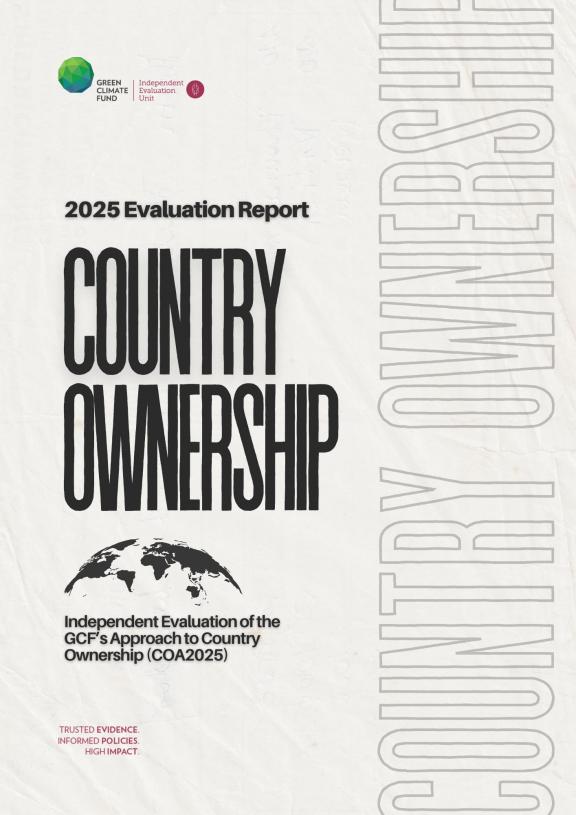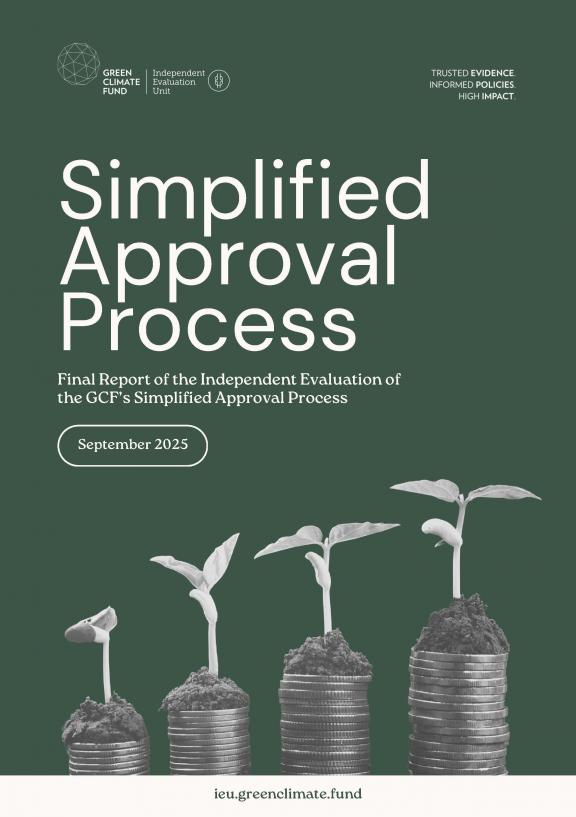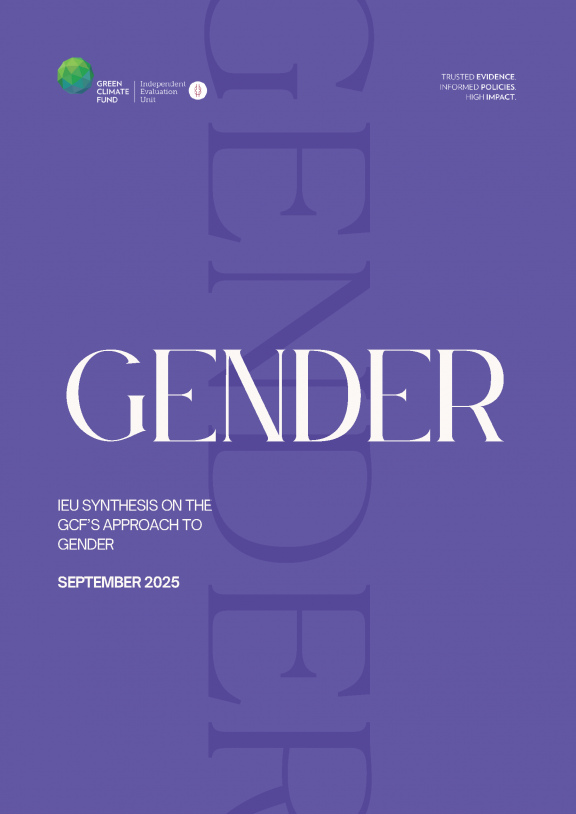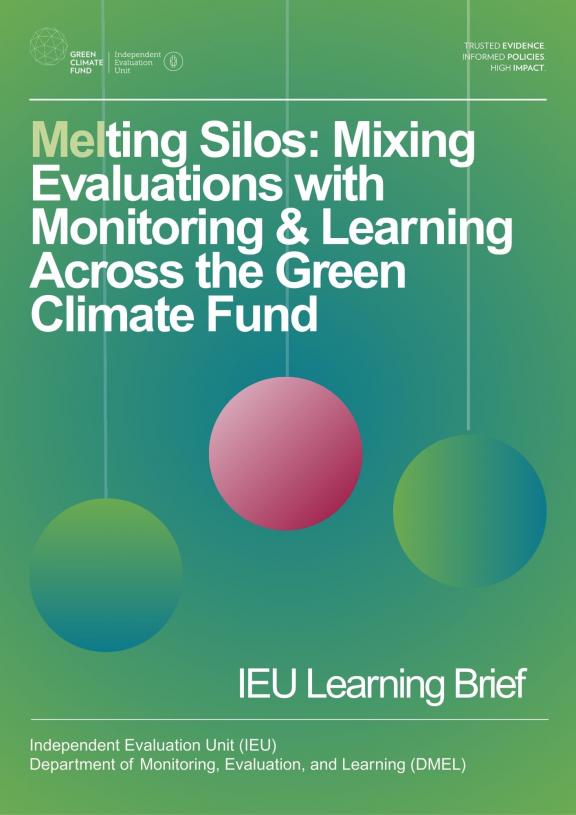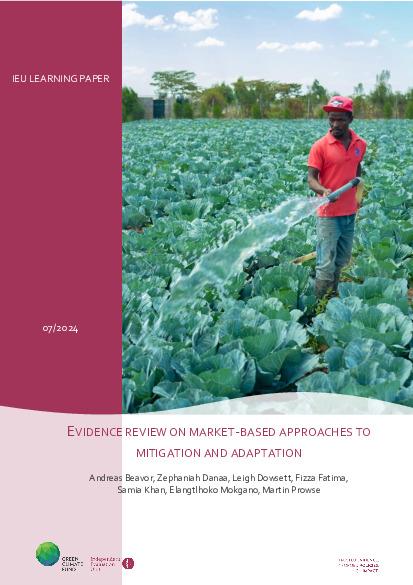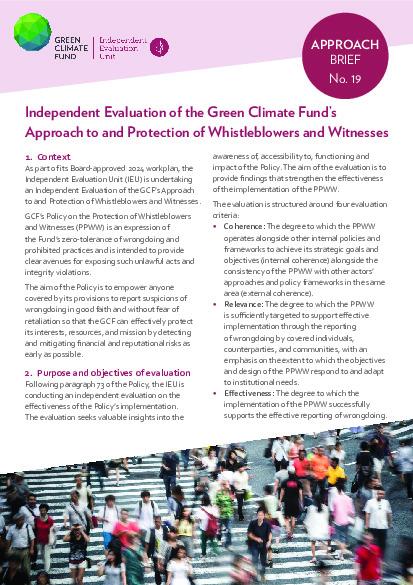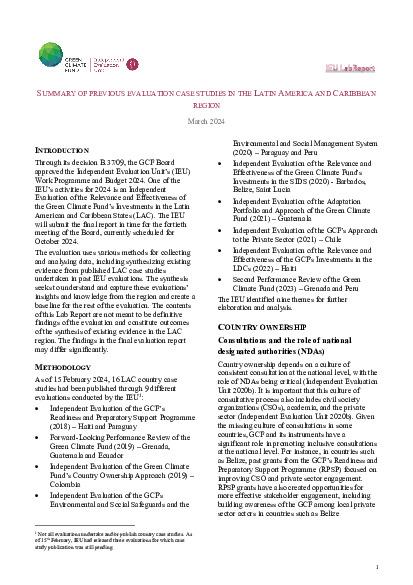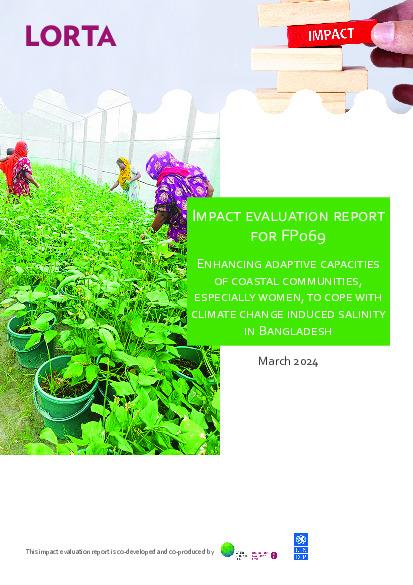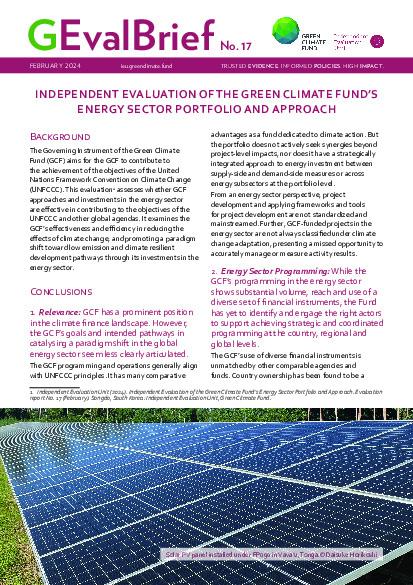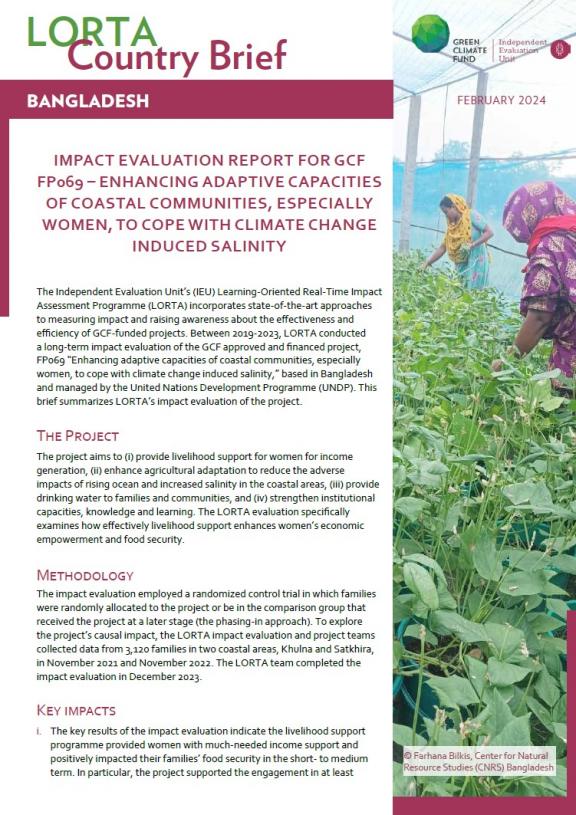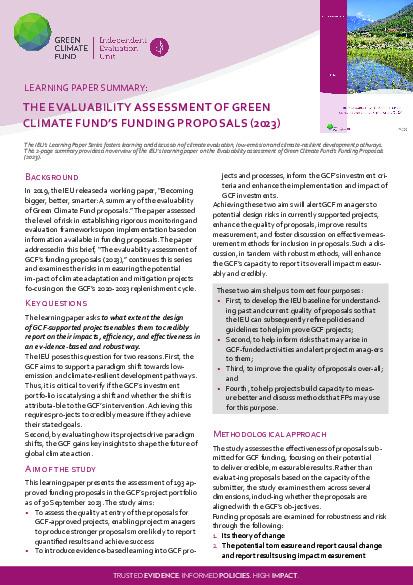IEU publications
IEU publications
To serve the needs of our stakeholders, the IEU issues a variety of publications related to our work, including in the context of evaluations and learning. Keep up with the IEU’s latest publications here.
Featured publications
Independent Evaluation of the GCF's Approach to Country Ownership (COA2025)
This independent evaluation of the Green Climate Fund’s (GCF) approach to country ownership was approved by the GCF Board as part of the 2025 workplan of the Independent Evaluation Unit (IEU) and is submitted in time for its forty-third meeting (B
Independent Evaluation of the GCF’s Simplified Approval Process (SAP2025)
The Green Climate Fund’s Simplified Approval Process (SAP) was created to make climate finance more accessible and responsive, thus enabling smaller, lower-risk projects to address urgent climate needs in vulnerable countries.
Independent Synthesis of the GCF’s Gender Approach
Approved at the fortieth meeting of the GCF Board (B.40), this formative Gender Synthesis consolidates insights from past evaluations, assessments, and studies to inform the forthcoming Independent Evaluation of the GCF’s Gender Approach.
MELting Silos: Mixing Evaluations with Monitoring & Learning Across the Green Climate Fund
This IEU Learning Brief, prepared jointly by the Independent Evaluation Unit (IEU) and the Department of Monitoring, Evaluation, and Learning (DMEL), examines how the Green Climate Fund (GCF) can better align its monitoring, evaluation, and learni
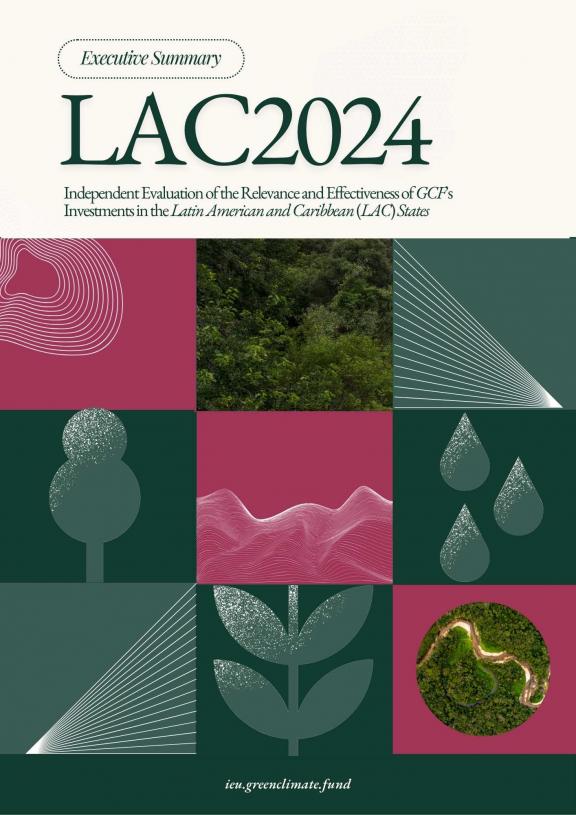
LAC2024: Executive Summary
September 2024
This executive summary presents key findings and recommendations from the independent evaluation of GCF investments in Latin America and the Caribbean (LAC). It assesses relevance, effectiveness, country ownership, and coherence of GCF support in the region, while identifying opportunities to enhance access, improve institutional engagement, and strengthen implementation.
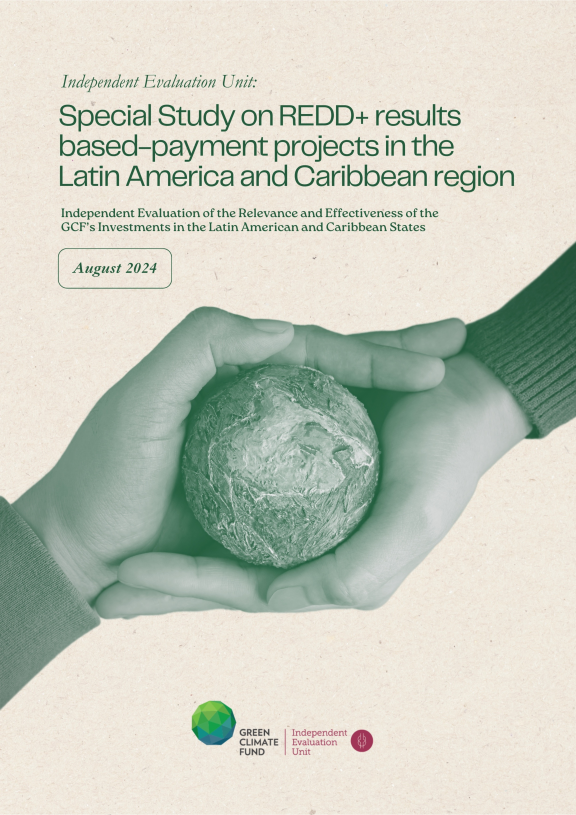
Special Study on REDD+ Results-Based Payment Projects in the Latin America and Caribbean Region
August 2024
The Special Study on REDD+ Results-Based Payment Projects in the Latin America and Caribbean Region report was prepared to assess the relevance, effectiveness, and efficiency of GCF’s investments in REDD+ projects in the region. This study focuses on common findings and lessons across relevant projects and aims to inform the redesign and future development of the REDD+ Results-Based Payment (RBP) program within the Green Climate Fund.
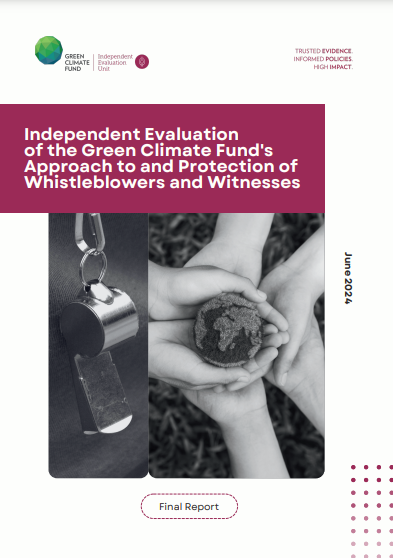
Final Report of the Independent Evaluation of the Green Climate Fund's Approach to and Protection of Whistleblowers and Witnesses
August 2024
This final evaluation report presents the findings and recommendations of an independent evaluation of the GCF’s approach to and protection of whistleblowers and witnesses undertaken by the Independent Evaluation Unit (IEU). The IEU conducted this evaluation as part of its 2024 Work Plan, which was approved by the Board at its thirty-seventh meeting (B.37) in October 2023 (Decision B.37/09 Annex VI). As per the 2023 IEU workplan, the evaluation aimed to provide valuable insights into the Policy...
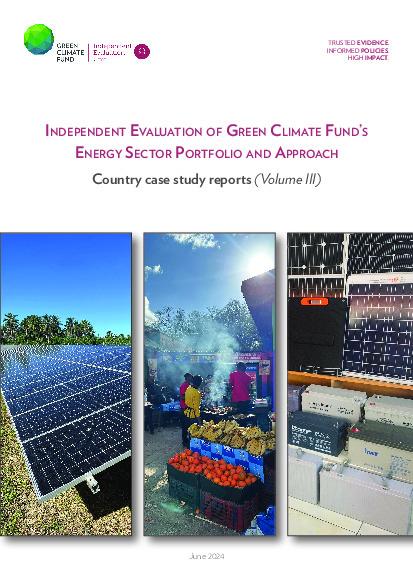
Country Case Studies of the Independent Evaluation of the Green Climate Fund's Energy Sector Portfolio and Approach
July 2024
This country case study report has been prepared as an input into the Independent Evaluation of the Green Climate Fund’s Energy Sector Portfolio and Approach, conducted by the Independent Evaluation Unit (IEU) of the Green Climate Fund (GCF). The report includes detailed analyses from country missions and interviews conducted in Chile, Indonesia, Mongolia, North Macedonia, Tonga, and Zambia.
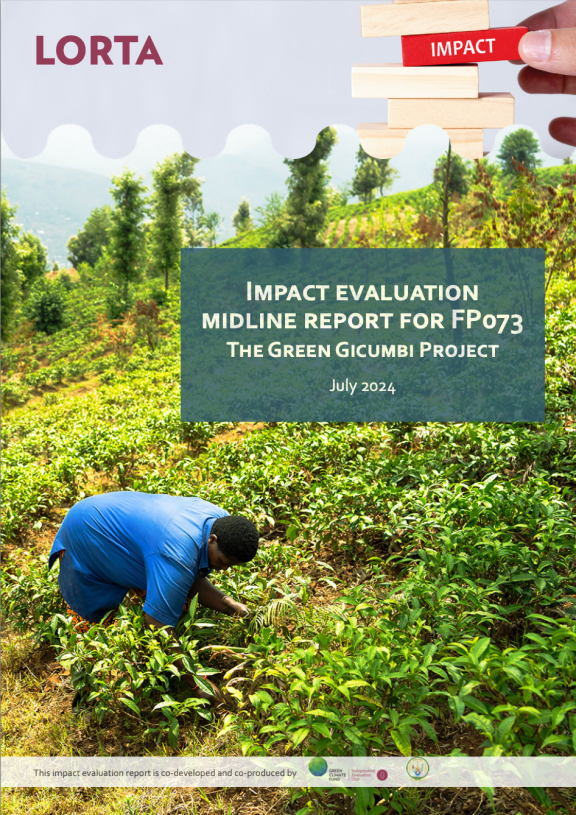
Impact Evaluation Midline Report for FP073 - Strengthening climate resilience of rural communities in Northern Rwanda
July 2024
This is a midline impact evaluation report of the GCF project FP073 Strengthening climate resilience of rural communities in Northern Rwanda, commonly known as Green Gicumbi Project. The project aims to restore and enhance ecosystem services in one of the sub-catchments of the degraded Muvumba watershed, increase the capacity of communities to renew and sustainably manage resources, and support smallholders to adopt climate resilient agriculture. The project has been evaluated at midterm...
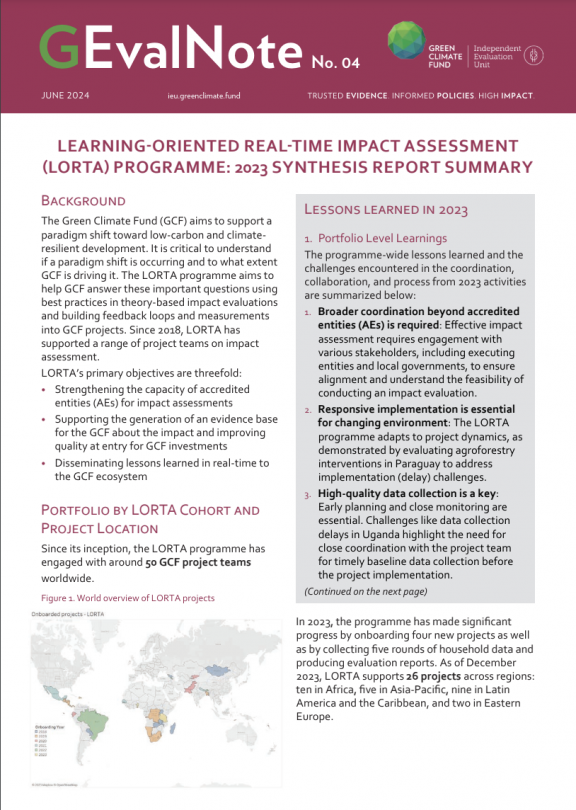
GEvalNote 04: LORTA 2023
June 2024
The multi-year Learning-Oriented Real-Time Impact Assessment (LORTA) programme keeps track of the impact of GCF investments. Its goal is to assist GCF projects measure their impact in lowering greenhouse gas emissions and enhancing resilience to climate change, and if so, by how much. LORTA’s assistance includes, among other things, building and clarifying theories of change, co-building real-time and longer term measurement systems and helping projects use quantitative and qualitative...
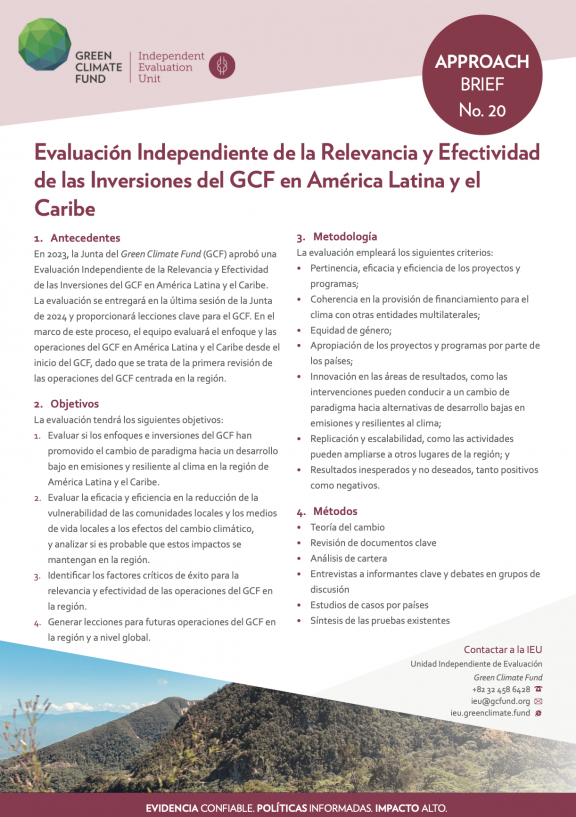
Approach Brief: Independent Evaluation of the Relevance and Effectiveness of GCF Investments in Latin America and the Caribbean States
May 2024
This brief summarizes the approach paper for the Independent Evaluation of the Relevance and Effectiveness of the GCF's Investments in the Latin American and Caribbean (LAC) States.
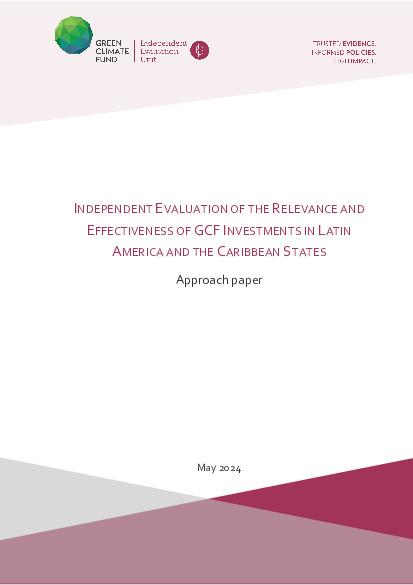
[Approach Paper] Independent Evaluation of the Relevance and Effectiveness of GCF Investments in Latin America and the Caribbean States
May 2024
During the thirty-seventh meeting of the GCF Board, the 2024 IEU workplan was approved, which includes an Independent Evaluation of the Relevance and Effectiveness of GCF Investments in Latin America and the Caribbean (LAC) States. The evaluation will assess whether GCF approaches and investments have promoted the paradigm shift towards low-emission and climate-resilient development pathways in the region and assess effectiveness and efficiency in reducing the vulnerability of local communities...
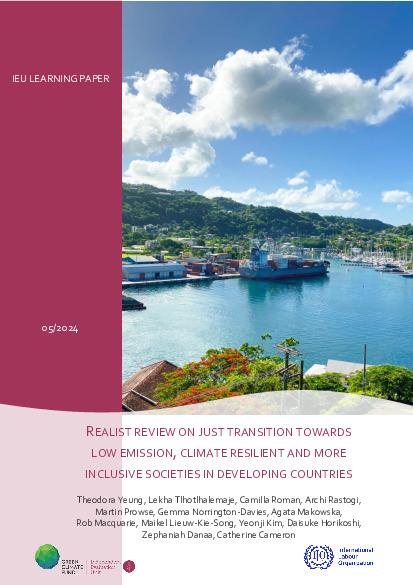
Realist review: Just transition towards low emission, climate resilient and more inclusive societies in developing countries
May 2024
The realist review found that common enablers for just transition interventions across all or most sectors included robust funding mechanisms, strong alignment with needs and priorities, political will and ownership, alongside social dialogue and stakeholder engagement. Common barriers to successful just transition across all sectors included bureaucratic and legal barriers, exclusion and unequal distribution of benefits, as well as inadequate technical skills. These findings are covered in...
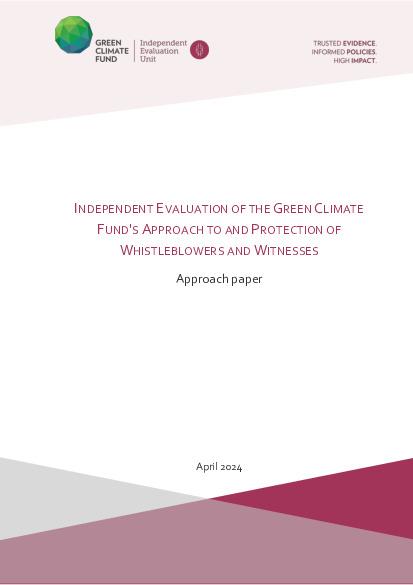
[Approach Paper] Independent Evaluation of the Green Climate Fund’s Approach to and Protection of Whistleblowers and Witnesses
April 2024
Board decision B.BM-2018/21 paragraph (a) adopted the Policy on the Protection of Whistleblowers and Witnesses (hereafter referred to as “the Policy”). The purpose of the Policy is to empower anyone covered by its provisions to report suspicions of wrongdoing in good faith and without fear of retaliation so that the GCF can effectively protect its interests, resources, and mission by detecting and mitigating financial and reputational risks as early as possible. The IIU is responsible for...
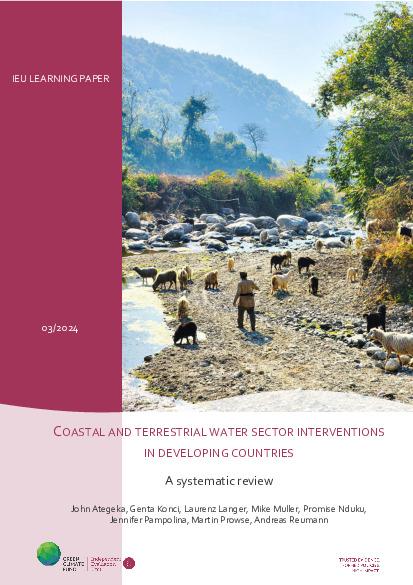
Systematic review: Coastal and terrestrial water sector interventions in developing countries
March 2024
Based on a rigorous protocol and companion evidence gap map, our systematic review conducts meta-analyses of water sector interventions in four areas: built infrastructure, nature-based options, institutional interventions, and financial/market mechanisms. The results suggest that water-efficient irrigation systems and ecosystem-based watershed management stand out as valuable tools for enhancing adaptive capacity, warranting specific attention. The complexity and diversity of water resources...
